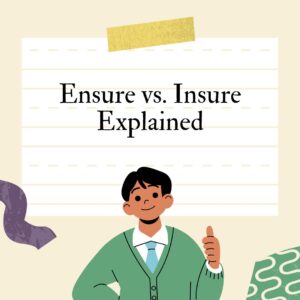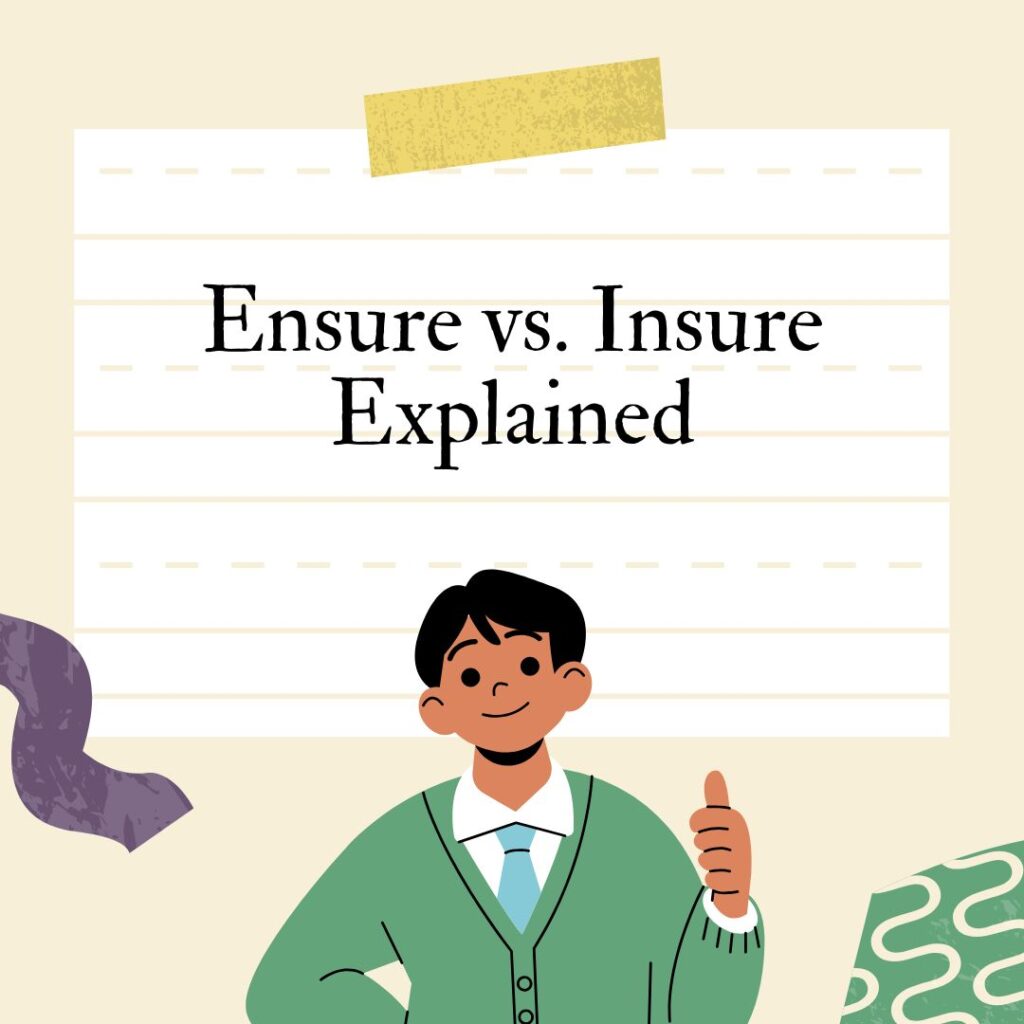Ensure vs. Insure: Understanding the Differences and Proper Usage
The English language is rich with nuances, and among the many pairs of commonly confused words, ensure and insure often lead to misunderstandings. While they may sound similar and are sometimes used interchangeably, they have distinct meanings and applications. This comprehensive guide will clarify the differences between ensure and insure, provide examples of their usage and offer tips on how to use them correctly in your writing.

Table of Contents
Definitions of Ensure and Insure
Ensure
Ensure is a verb that means to make certain that something will happen or to guarantee an outcome. It is about taking steps to remove doubt or risk regarding a specific result.
Example:
- To ensure you catch the train, set your alarm for 6 AM.
Insure
Insure, on the other hand, primarily refers to the act of providing financial protection against loss or damage through an insurance policy. It is often used in contexts related to health, property, or life insurance.
Example:
- You should insure your car against theft and accidents.
The Historical Context
The terms ensure and insure have different origins and usages in English:
- Ensure: Derived from the Old French word ensurer, which means “to make sure.” It has been used in English since the 15th century.
- Insure: Originating from the Latin securare, meaning “to make secure,” it became associated with financial protection in the 17th century.
While both words have evolved over time, their distinct meanings have remained intact.
When to Use Ensure
Use ensure when you want to convey the idea of making certain that something happens or guaranteeing an outcome:
- Guaranteeing Outcomes:
- Example: We need to ensure that all safety protocols are followed.
- Removing Doubt:
- Example: To ensure clarity, please double-check your calculations.
- Taking Precautionary Measures:
- Example: I will ensure that all necessary documents are submitted on time.
Summary of Usage
Whenever you are talking about making something certain or guaranteeing a result, opt for ensure.
When to Use Insure
Use insure when discussing financial protection against potential risks or losses:
- Financial Protection:
- Example: It’s essential to insure your home against natural disasters.
- Insurance Policies:
- Example: You should insure your health with a comprehensive plan.
- Risk Management:
- Example: Many businesses insure their assets to mitigate financial losses.
Summary of Usage
Whenever you refer to protecting against financial loss or discussing insurance policies, use insure.
Common Confusions and Misconceptions
Are They Interchangeable?
While some people may use ensure and insure interchangeably in casual conversation, they are not interchangeable in writing. Using one in place of the other can lead to confusion about your intended meaning.
Is One More Formal Than the Other?
Generally speaking, ensure is considered more formal than insure. In professional writing or academic contexts, it’s advisable to use “ensure” when discussing guarantees or certainties.
What About “Assure”?
Another term often confused with “ensure” and “insure” is “assure.” While all three words relate to certainty, they have distinct meanings:
- Assure: To reassure someone or remove doubt.
- Example: I assure you that everything will be alright.
Examples of Usage
To illustrate the differences further, here are some examples:
Ensure
- Correct Use: “To ensure a successful event, we must plan meticulously.”
- Incorrect Use: “I will insure my presentation goes well.” (Should be “ensure.”)
Insure
- Correct Use: “You must insure your belongings before traveling.”
- Incorrect Use: “I want to ensure my car against theft.” (Should be “insure.”)
Regional Variations
In some regions, there may be variations in how these terms are used:
- American English: Both terms are commonly used with their respective meanings.
- British English: Tends to favor “ensure” more frequently in formal contexts but uses both terms correctly.
Understanding regional preferences can help tailor your writing based on your audience.
Tips for Writers
- Know Your Audience: Consider who will read your work; choose accordingly between “ensure” and “insure.”
- Stick to Formality Levels: Maintain consistency throughout your document by using one form based on the level of formality required.
- Proofread Carefully: Ensure that your choice aligns with your intended tone; avoid mixing both forms within the same piece unless stylistically intended.
- Stay Updated on Language Trends: Language evolves; keep an eye on how usage trends shift over time.
FAQs
What is the difference between ensure and insure?
Ensure means to make certain that something will happen or to guarantee an outcome, while insure refers specifically to providing financial protection against loss or damage through an insurance policy.
Can I use ensure and insure interchangeably?
No, they are not interchangeable. Using one in place of the other can lead to confusion about your intended meaning. Always choose based on the context of your sentence.
When should I use ensure?
Use ensure when you want to convey the idea of making certain that something happens or guaranteeing a result. For example: “We need to ensure that all safety measures are in place.”
When is it appropriate to use insure?
Use insure when discussing financial protection, such as insurance policies for health, property, or life. For example: “You should insure your home against fire damage.”
What about the word assure? How does it differ?
Assure means to reassure someone or remove doubt. While ensure guarantees an outcome and insure relates to financial protection, assure is about providing confidence to someone else. For example: “I assure you that everything will be fine.”
Are there regional differences in the usage of these terms?
Yes, while both terms are used correctly in American and British English, British English tends to favor “ensure” more frequently in formal contexts.
Is one term more formal than the other?
Generally, ensure is considered more formal than insure. In professional writing or academic contexts, it’s advisable to use “ensure” when discussing guarantees or certainties.
Can you provide examples of correct usage for both terms?
Certainly!
- Ensure: “To ensure a successful project, we must adhere to the timeline.”
- Insure: “It’s important to insure your vehicle against theft.”
What are common mistakes people make with these terms?
Common mistakes include using “insure” when they mean “ensure” and vice versa, especially in casual conversation where the difference may not seem significant.
How can I remember when to use each term?
A helpful tip is:
- Think of “ensure” as related to certainty (both start with ‘E’ for ‘E’vidence).
- Think of “insure” as related to finance (both start with ‘I’ for ‘I’nvestment).
Conclusion
Understanding the differences between ensure and insure is crucial for clear communication in writing. By recognizing when to use each term appropriately, you can enhance your writing’s professionalism and clarity. As language continues to evolve, being aware of these distinctions will help you communicate more effectively with your audience. Whether you choose to embrace modern trends or stick with traditional grammar rules, knowing when and how to use each form will make you a more versatile writer. Happy writing!
Discover marketing services, interviews & publishing tools at SharingStories.




